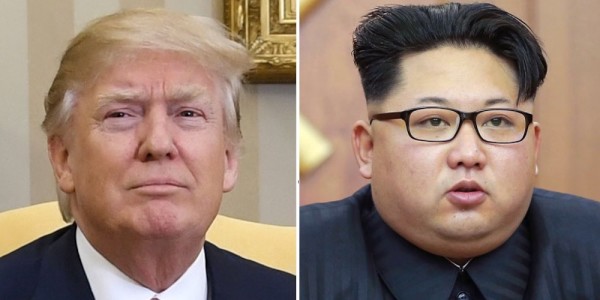

A lot is riding on President Trump’s upcoming meeting with North Korean dictator Kim Jong Un about the future of North Korea’s nuclear weapons and missile programs. It’s a risky move for Trump that may pay off in getting the rogue nation to agree to getting rid of its nuclear weapons.
Two Medal of Honor recipients who fought against the brutal North Korea regime urged Trump to stand firm if Kim demands concessions from the United States.
“I wouldn’t trust that varmint as far as I could throw him,” said Ronald Rosser, who joined the Army after his brother was killed in Korea and went on to receive the nation’s highest military award for valor. “I don’t believe he’s got one honest word in his mouth.”
On July 7, 1952, Rosser charged enemy hilltop bunkers three times, armed only with his carbine and grenades, his award citation says. He twice ran back for more ammo and grenades. All the troops who followed him up the hill to attack the bunkers became casualties. Although wounded himself, he braved fierce enemy fire to move the wounded to safety.
His wartime experiences have led him not to trust North Koreans, he told Task & Purpose.
Related: They Fought Against Commies In Korea. And They Say Trump Is Making The Right Move »
“They talked some of our people into surrendering when they were surrounded,” Rosser said. “The guys surrendered and the North Koreans shot them. They shot our wounded and all kinds of other crap. It was bitter fighting over there. If you didn’t fight to the death over there, they butchered you.”
Rosser said he doubts Trump can reach an agreement with Kim because the North Koreans have no intention of making concessions on either nuclear weapons or missiles. His advice to Trump is to use more carrot than stick when talking to Kim.
“If I were the president, I wouldn’t bend one bit to agree with that varmint,” Rosser said. “I’d tell him, ‘You got to stop doing that stuff.’”
Another Korea hero, Hiroshi Miyamura, said he is more hopeful that Trump and Kim can reach an accommodation after more than six decades of hostility between the United States and North Korea. Miyamura’s Medal of Honor was kept secret for more than two years while he was held by the Chinese as a prisoner of war.
Related: Trump To Meet With North Korean Dictator Kim Jong Un »
Between April 24 and 25, 1951, Miyamura repelled overwhelming enemy attacks, bayonetting 10 enemy soldiers in close hand-to-hand fighting and then killing another 50 more while manning a machine gun position as his fellow soldiers withdrew, his award citation reads.
Miyamura said he was surprised that Kim offered to talk to Trump but he is also glad that the president accepted Kim’s invitation. The United States needs to talk to Kim to determine if the North Korean is willing or capable of making peace, he said.
Moreover, North Korea’s nuclear program is a threat to the entire world, not just the United States, so Trump is “on the right track” by agreeing to meet Kim, Miyamura said.
“When you get a madman in control of something like that, you don’t know what he might decide he wants to blow someone up,” Miyamura said. “It’s hard to let him have that power over the world.”
Miyamura said he favors the U.S. negotiating with North Korea under certain conditions. For example, it should be a deal-breaker if Kim demands that the U.S. withdraw all its troops from South Korea, he said.
In any event, the United States needs to talk to Kim “to see what he’s up to,” Miyamura said.
“I think he feels confident enough that he’s reached the point where the world knows he has these weapons,” Miyamura said. “He’s accomplished that, so now he’s willing to talk – and that’s the thing, you don’t know what he wants. You have to meet together to find out what he wants.”
WATCH NEXT: